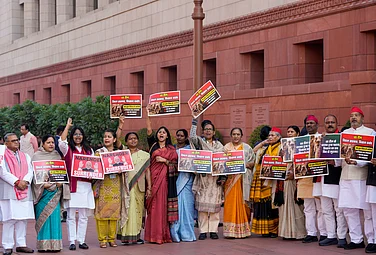China and Turkey dropping out of the G-20 meeting of tourism officials in Srinagar kick-starting on Monday were to be expected. Both countries had raised concerns since the scrapping of Kashmir’s special status in August 2019. Unlike Pakistan’s former prime minister Imran Khan and Türkiye’s President Erdogan, who slammed India for repressing the rightful aspirations of the people of Kashmir and for human rights abuse, China had been hitting out against the reorganization of Ladakh into a union territory.
Two days after home minister Amit Shah made the announcement in 2019, China questioned the decision. "China is opposed to India’s inclusion of Chinese territory in the western sector of the China-India boundary, into its administrative jurisdiction.’’ It was opposed to Ladakh coming under direct central rule. Since then, it has continued to make such statements. Many believe that the PLA action in Ladakh in the summer of 2020, which led to a military confrontation was triggered by this administrative reorganization. Three years since that face-off both countries have amassed troops on the border and the situation remains tense.
In October 2020, even as Indian and PLA military commanders were meeting, the foreign office spokesman had said, "First I want to make it clear that China does not recognise the Ladakh Union Territory illegally set up by the Indian side and the Arunachal Pradesh,” adding, “We stand against the development of infrastructure facilities aimed at military contention along the border area.” So, the refusal to participate in the tourism meet in Kashmir falls in line with the general trend of China’s views on Ladakh.
China has said it will not take part in any meeting held on "disputed" territory. Despite the Ladakh military stand-off, China has attended all the G-20 meetings hosted by India, including the foreign minister’s conclave in Delhi. Foreign Office spokesman Weng Wanbin said in his weekly interaction with the press on Friday, "China is firmly opposed to holding any kind of G-20 meetings in disputed territory and will not attend such meetings.’’
India is holding the rotating presidency of G20 this year and has organized several meetings through the length and breadth of the nation. The meeting in Srinagar is special, as New Delhi hopes to showcase that all is well in Kashmir and counter Pakistan and the narrative of military repression in the union territory. New Delhi hopes to focus on boosting tourism and take delegates on a tour of the major tourist destinations in Kashmir. The underlying message is that Kashmir is on the path to development and progress under central rule.
Turkey’s President Erdogan sees himself as the leader of the Muslim world and has been challenging Saudi Arabia’s position as the keeper of the faith, by virtue of holding the key to Sunni Islam’s holiest shrines in Mecca and Medina. Riyadh had not joined the Pakistan-led chorus on Kashmir. But Erdogan whose party freely mixes religion and politics, has from the beginning lashed out at India on Kashmir. So, his refusal to send a representative to Kashmir is also not surprising. The rest of the international community, except human rights groups had not commented on the scrapping of Kashmir’s special status, but had conveyed their concern about the lockdown and denial of internet and mobile access to citizens for several months.
However, the UN Special Rapporteur on Minority Issues had consistently spoken out on Kashmir. The G20 meeting in Srinagar also came in for criticism, "By holding a G20 meeting of the working group on tourism on 22-24 May,” Fernand de Varennes said, "The Government of India is seeking to normalise what some have described as a military occupation by instrumentalizing a G20 meeting and portray an international 'seal of approval.”
China and Turkey dropping out from a tourism meeting will be at most a blip in the proceedings, but will not make much of a dent. It would have been different if China boycotted every event organised during India's presidency.



























